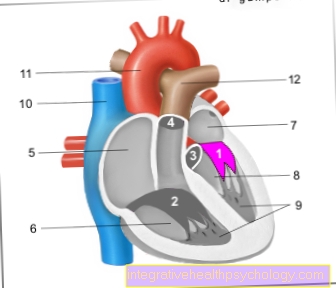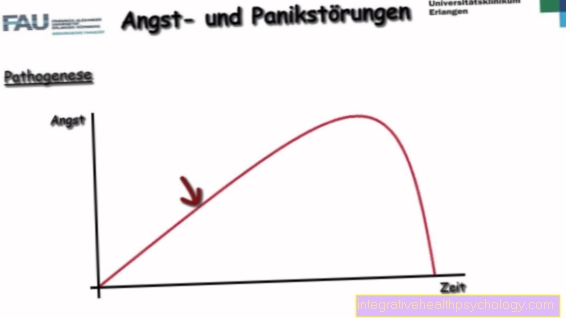Allergy pass
introduction
An allergy pass is a document in which substances to which a person is known to be allergic can be noted. The pass can be requested free of charge both online and from health insurers. It is filled out by the attending physician, e.g. the family doctor or the doctor who discovered the allergy. As a rule, the patient does not even have to worry about obtaining the passport, as most allergists have numerous blank allergy passports available in their practice.

Who needs an allergy pass?
Numerous people suffer from allergies these days. The spectrum ranges from the widespread hay fever (pollen allergy) to food allergies, house dust allergies, animal hair allergies and insect venom allergies. Not everyone who suffers from an allergy needs an allergy passport. For example, patients with hay fever or allergies to house dust or animal hair do not need an allergy pass. The allergy pass is primarily important if the allergy can be potentially dangerous. This is particularly the case with food allergies and insect venom allergies, for example. People who suffer from a nut allergy, for example, have a significantly increased risk of suffering anaphylactic shock.
Anaphylactic shock is the maximum variant of an allergic reaction. This can lead to a swelling of the airways, a racing heart and a drop in blood pressure up to and including cardiac arrest. Such a risk also exists in people with an insect venom allergy.
In addition to such allergies, an allergy pass can also be used for allergies to certain medications or ingredients. For example, allergies to latex, plasters, nickel or medication such as certain antibiotics. Here contact with the allergen can lead to severe skin rashes. Anaphylactic shock is theoretically possible even with this form of allergy. An allergy pass is therefore always important if the allergy can be potentially dangerous and may require rapid treatment.
Learn more about the topic at: The allergic shock
What is noted in the allergy pass?
All substances that are known to be allergic to the patient are noted in an allergy passport. As already mentioned, allergies such as animal hair allergies or pollen allergies do not actually have to be noted here because these allergies restrict life, but do not lead to life-threatening allergic reactions. Examples of substances that could be noted in an allergy pass are food allergies such as a nut allergy, insect venom allergies, drug allergies such as antibiotics or other drugs or allergies to certain ingredients such as fragrances or substances such as latex.
Read more about these topics at:
- Food allergy
- Pet hair allergy
- pollen allergy
What does an allergy pass cost and does the health insurance company pay for it?
The issuance of an allergy pass by the family doctor or allergist is free of charge, regardless of the health insurance provider. The preceding corresponding allergy tests, for example prick test or patch test, are in most cases - if there is a justified suspicion of an allergy - covered by the statutory and private health insurance companies. In individual cases, a cost coverage should be discussed beforehand with the health insurance company or the treating doctor.
Read more on this topic at: Allergy diagnostics
Which doctor can I get an allergy passport from?
In theory, any doctor can issue an allergy pass. The doctors who issue allergy passports are particularly practical because they usually also diagnose the allergy. But the dermatologist or a hospital can also issue an allergy pass.
Can I also order it online?
A blank allergy pass can be downloaded online and then printed out. There are also websites where the patient can fill out an allergy passport himself. This will then be sent by post. This incurs costs, depending on the website. Additional costs are charged online, especially for multilingual allergy ID cards.
It is recommended that the attending physician review the allergy passport you have filled out yourself before sending it off / printing it out so that there are no errors and that important information is not missing.
What is an international allergy pass?
An international allergy passport is not only filled out in German but in one or more other languages. In the case of patients traveling abroad, he should ensure that in an emergency situation it is clear which allergies the patient is suffering from. This can be decisive, for example, if a patient has an acute allergic attack or if he has to be treated in a hospital and has relevant drug allergies.
How can I ensure that my allergy passport is found in an emergency?
So that an allergy passport can be found in an emergency, the person concerned should always carry it with them. Best in the wallet or in a transparent film that is stowed in the same place as the wallet. Relatives should be informed where the allergy pass can be found in an emergency so that they can make it available to the doctors treating the acute case. An allergy pass that is kept at home while a patient with insect venom allergy is stung by a wasp on an excursion is a risk that those affected should not take. In the worst case, the person affected is alone and already unconscious when the ambulance service arrives, so that he can no longer provide any information about his allergies. In such situations, an allergy pass can be life-saving.






.jpg)






















